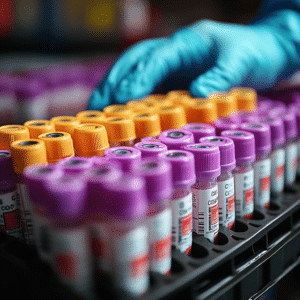What is Family Therapy for Addiction?
Understanding the Essence:
Family therapy for addiction involves structured therapy sessions that include the individual battling addiction and their family members. This approach understands and addresses the complexities of addiction’s impact on the entire family unit, striving for collective healing and resilience. By weaving together the individual narratives and pain points within the family, therapy creates a tapestry of support where every thread reinforces the other.
The Impact of Addiction on Families
Understanding the Reach:
Addiction doesn’t just affect the person struggling with substance use; it ripples through their immediate surroundings, disrupting family dynamics, financial stability, and emotional well-being. The National institute on Drug abuse ( Nida ) emphasizes that tackling addiction requires understanding these secondary effects. Family therapy helps untangle these threads by confronting and managing the multifaceted impacts effectively. This collective approach to healing brings forth a path of clarity and strength.
| **Aspect** | **Description** |
|---|---|
| Definition | Family therapy for addiction involves the participation of family members to support recovery and improve family dynamics. |
| Purpose | Helps families have open and honest dialogues about addiction, improving communication, emotional support, and collective problem-solving skills. |
| Initial Steps | – Search for local support groups via social media and online forums. |
| – Book a family therapy session to start professional treatment. | |
| Common Types of Family Therapy | – Cognitive Behavioral Therapy (CBT): Focuses on changing negative thought patterns and behaviors within the family context. |
| – Systemic Family Therapy: Addresses family relationships and interactions, understanding systemic links to problematic behaviors. | |
| – Structural Family Therapy: Analyzes and restructures the family organization to support healthier functioning. | |
| – Narrative Therapy: Empowers families to reframe and rewrite the family’s narrative to overcome addiction-related challenges. | |
| Family Behavior Therapy | – Target Audience: Youth and at least one caregiver. |
| – Focus: Uses behavioral techniques to improve family functioning. | |
| – Efficacy: Shown initial efficacy in treating adolescent substance use. | |
| Interventions | – Instruction Mediums: Individual or small group sessions, web-based modules, printed manuals, workbooks, or combination formats. |
| – Skills Developed: Substance use prevention skills among parents and caregivers, improved family management strategies. | |
| Benefits | – Enhances emotional and behavioral support. |
| – Provides practical strategies for managing addiction within the family. | |
| – Encourages an environment of mutual support and shared responsibility. | |
| Obtaining Help | – Contact local support groups via internet searches or community boards. |
| – Seek recommendations from healthcare providers or addiction specialists. | |
| Cost Considerations | Varies by provider, location, and type of therapy. Some services may be covered by insurance, while others might offer sliding scale fees or free options through non-profits. |
How Family Therapy for Addiction Works
Structured Process:
Family therapy employs evidence-based practices like Cognitive Behavioral Therapy (CBT), Systemic Approaches, Structural Family Therapy, and Narrative Therapy. These techniques foster healthier communication patterns and relationships. Real-world examples from the Betty Ford Center illustrate how these structured interventions can anchor families amidst the storm of addiction, guiding them towards peaceful and productive interactions.
Benefits of Family Therapy for Addiction
Enhanced Communication:
Training family members in clear, compassionate communication helps break down walls built by years of misunderstanding and resentment. Programs at the Hazelden Betty Ford Foundation have shown significant progress when families learn to listen actively and express empathy. This newfound dialogue paves the way for acceptance and understanding, which are critical elements of recovery.
Strengthened Support Networks:
Addiction often isolates individuals, causing a rift in familial bonds. Family therapy reestablishes a supportive environment that counteracts this isolation. The Al-anon Family groups showcase how strengthening familial bonds builds trust, fortifying the recovery journey and making it less lonely.
Addressing Co-dependency:
Many family members inadvertently develop co-dependent behaviors that perpetuate addiction cycles. Professionals from the Center for Motivation and Change emphasize the importance of identifying and altering these behaviors. This creates healthier family dynamics that support long-term recovery rather than sustain harmful patterns.
Real Stories of Transformation
Case Study: The Lehrman Family
Ellen Lehrman’s narrative underscores the transformative potential of family therapy. After seeking help from the Caron Treatment Centers, her family engaged in intensive sessions that not only aided her son’s recovery but rebuilt their entire familial structure, leading to a more supportive and understanding household. This journey exemplifies the profound impact of targeted therapeutic intervention.
Case Study: The Hassan Family
The Hassan family’s journey with addiction treatment at the Phoenix House demonstrated remarkable resilience. By utilizing ongoing therapy, they overcame cultural stigmas associated with addiction, fostering open dialogues that ultimately led to sustained recovery and strengthened familial bonds. Their story illuminates the power of persistent and compassionate family engagement.
The Role of Therapists in Family Therapy for Addiction
Expert Guidance:
Skilled therapists play a crucial role in navigating the emotional landscape of families dealing with addiction. Institutions like the Substance Abuse and Mental Health Services Administration (SAMHSA) provide professionals whose expertise ensures that families can confront unresolved issues, trauma, and learn new coping mechanisms. Their guidance is a beacon of hope in these challenging times.
Recognizing The Signs: When to Seek Family Therapy
Identifying Crisis Points:
Knowing when to seek help is vital. Signs like persistent conflicts, withdrawal of the addicted person from family interaction, or noticeable emotional distress among family members suggest the need for professional intervention. Experts from the Mayo Clinic recommend being vigilant for these indicators to facilitate timely support and prevent further deterioration.
Navigating the Challenges of Family Therapy for Addiction
Overcoming Hurdles:
Family therapy comes with its own set of challenges. Resistance from family members, deeply ingrained unhealthy patterns, and financial constraints are common. Programs at the Family Institute address these obstacles with persistence and customized approaches, ensuring therapy remains accessible and effective for all families in need.
Long-term Outcomes of Family Therapy for Addiction
Sustained Recovery and Relapse Prevention:
The ultimate goal of family therapy for addiction is sustainable recovery. Studies from the Journal of Substance Abuse Treatment demonstrate that families who engage in therapy have significantly higher recovery rates and lower relapse incidences. Longevity in recovery is strengthened by continuous family support and active engagement in therapeutic practices.
Innovative Approaches in Family Therapy for Addiction
Technological Integration:
Incorporating technology into therapy, such as virtual sessions offered by platforms like Talkspace, has transformed its accessibility. This is especially crucial in a post-pandemic world, ensuring support is available regardless of geographical limitations. These innovations make therapy more adaptable to modern family needs, ensuring no one is left behind.
Moving Forward with Family Therapy for Addiction
Family therapy for addiction stands as a beacon of hope amid the darkness of addiction. By empowering families through education, structured support, and evidence-based interventions, we can turn the tide on addiction’s impact, promoting lasting, positive change within families. The journey is undoubtedly challenging, but the strength drawn from familial bonds offers the most resilient foundation for a future free from the chains of addiction.
For more information and support, visit Mothers Against addiction, where we stand by parents and families every step of the way.
Family Therapy for Addiction: Key to Healing Families
The Importance of Family Therapy for Addiction
Family therapy for addiction plays a crucial role in healing families torn apart by substance abuse. It’s not just about addressing individual issues but also focusing on the family dynamics that may have contributed to the problem. For instance, Children Of Addicts often face unique challenges, including emotional neglect and instability, which can ripple through their lives and affect their future relationships. Engaging in family therapy helps to mend these fractures, offering a supportive environment where all members can express their feelings and work together towards recovery.
Surprising Connections and Trivia
Family therapy often leads to the discovery of unexpected connections within a family’s history. Did you know that many actors from the ‘Ghosts of Mississippi’ cast have been outspoken about their own or their loved ones’ struggles with addiction? This helps to normalize the conversation around drug and alcohol dependence, making it easier for families to seek help without feeling stigmatized. Coupled with therapy, learning about such stories can be quite empowering.
Interestingly, pets like ferrets can also play a therapeutic role in family settings. The presence of a pet has been shown to reduce stress and promote bonding among family members. In fact, having a ferret as a pet could provide the comfort and emotional support needed during tough times. Integrating the caring of a pet into family therapy sessions can sometimes make it easier for families to reconnect and build a routine that supports sobriety.
Innovative Approaches and Facts
The digital age has introduced innovative tools that can support family therapy for addiction. But be cautious; not all technology is beneficial. Online platforms like Omegle Gay have raised concerns for potentially exposing users, particularly young ones, to inappropriate content. Families need to be diligent and look for online resources that provide safe and constructive environments for recovery.
Moreover, advancements in artificial intelligence, like the AI clothes remover, showcase the rapid evolution of technology. Keeping pace with these changes is essential for families involved in therapy, helping them understand both the benefits and potential pitfalls of new technology. Balancing these digital tools with traditional forms of support can create a comprehensive approach to tackling addiction.
Family therapy for addiction isn’t a one-size-fits-all solution, but it certainly represents a vital component of the healing process. By integrating trivia and lesser-known facts, we not only enrich our understanding but also shed light on the myriad ways families can strengthen their bonds and support each other through recovery.
What can families do to cope with a loved one’s addiction?
Families can start by joining social media and online forums to find local support groups, or they might consider booking a family therapy session to foster open dialogue about the challenges of addiction. It’s essential to communicate honestly and support each other through this difficult time.
What is the family therapy approach to substance abuse?
Family therapy for substance abuse focuses on involving the youth and at least one caregiver and uses behavioral techniques to enhance family functioning. The goal is to improve communication and help the family work better together to support the loved one struggling with addiction.
What are the 4 types of family therapy?
The four types of family therapy are Cognitive Behavioral Therapy, Systemic Family Therapy, Structural Family Therapy, and Narrative Therapy. Each approach uses different techniques to address family dynamics and improve overall functioning.
What are family-based interventions for substance abuse?
Family-based interventions aim to teach parents and caregivers skills to prevent substance use in children and adolescents. These interventions can take many forms, including one-on-one sessions, small group meetings, web-based modules, printed manuals, and workbooks, or a mix of these formats.
What is the Sinclair method?
The Sinclair method involves using the medication naltrexone to reduce cravings and dependence on alcohol. This method combines medication with counseling and support to help people reduce their drinking over time.
What are three codependent behaviors in families with addiction?
Three common codependent behaviors in families with addiction include enabling the addict’s behavior, neglecting one’s own needs to care for the addict, and experiencing excessive worry or anxiety about the addict’s actions and well-being.
What is family therapy technique?
Family therapy techniques involve behavioral interventions that aim to improve communication and problem-solving skills within the family. The goal is to create a more supportive and functional family environment.
What is the best family therapy approach?
There’s no one-size-fits-all approach to family therapy, but many find success with Cognitive Behavioral Therapy (CBT) due to its structured, evidence-based methods. The best approach often depends on the family’s specific needs and dynamics.
What is the most common therapy for substance abuse?
The most common therapy for substance abuse is Cognitive Behavioral Therapy (CBT), which helps individuals identify and change negative thought patterns and behaviors related to their substance use.
What are the 5 stages of family therapy?
The five stages of family therapy usually include: identifying and assessing issues, setting goals, developing strategies, implementing interventions, and evaluating progress. Each stage is designed to help families work better together and support their loved ones’ recovery.
What is the difference between family counseling and family therapy?
Family counseling and family therapy are often used interchangeably, but therapy tends to be more intensive and longer-term, often focusing on deeper emotional and psychological issues, while counseling may be more short-term and solution-focused.
Is family therapy worth it?
Family therapy is often worth it, as it can improve communication, build stronger relationships, and offer new ways to cope with the challenges of addiction. Many families find that the support and guidance from a therapist make a positive difference.
How effective is family therapy for addiction?
Family therapy can be quite effective for addiction, as it addresses the issues that affect the entire family. By improving family dynamics and communication, it helps create a more supportive environment for recovery.
What is family systems therapy for substance use?
Family systems therapy looks at how each family member’s behavior affects the whole unit. For substance use, this therapy helps families identify patterns that contribute to addiction and work together to make positive changes.
What are the best therapy interventions for substance abuse?
Some of the best therapy interventions for substance abuse include Cognitive Behavioral Therapy (CBT), Dialectical Behavioral Therapy (DBT), Motivational Interviewing (MI), and contingency management. These methods offer structured support and have shown success in helping people overcome addiction.
What to do when a loved one has a drug addiction?
When dealing with a loved one’s drug addiction, start by seeking support from local groups or online forums, and consider family therapy to improve communication and support. It’s crucial to remain patient, supportive, and non-judgmental while encouraging your loved one to seek professional help.
What is the role of the family in addiction recovery?
The family’s role in addiction recovery includes offering emotional support, helping to create a stable environment, and participating in therapy sessions. Family members can also educate themselves about addiction to better understand and cope with the situation.
How to do an intervention with a family member?
To do an intervention with a family member, gather a group of close friends and family, work with a professional if possible, and plan what to say ahead of time. The goal is to express concern and encourage the person to seek treatment, without causing them to feel attacked or alienated.
What are the family rules of addiction?
Family rules of addiction often evolve around enabling behaviors, such as denying the problem exists, covering up for the addict, and putting the addict’s needs above everyone else’s. It’s important to recognize and change these patterns to support recovery effectively.




























